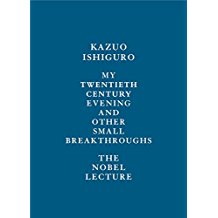My Twentieth Century Evening and Other Small Breakthroughs: The Nobel Lecture, Kazuo Ishiguro, 2017
Ishiguro won the Nobel Prize for Literature in 2017 and this book is his acceptance speech. Born in Japan, he moved to England at the age of 5 and has lived there since, accounting for his best known novel The Remains of the Day and subsequent books located in the UK. I’m glad I read this book rather than hearing it in the original in the audience because it’s a strange tale, winding through his writing experience highlighting several breakthrough moments—the need to preserve or get down on paper his impressions of a place (in this case, the Japan he created in his mind), the influence of Proust to enable him to write in a non-linear manner about the self-deception and denial in our view of ourself; the influence of the voice of singers to enable him to put emotions into words; the impact of a visit to Auschwitz on his need to enable nations to remember and face critical and painful questions about their past; the impact of film and Forester’s critique about the novel that led him to focus on relationships and not just individual characters. He refers to each of these moments as ‘important turning points in a writer’s career….—small scruffy moments….quiet, private sparks of revelation.” He finishes the lecture with a plea to ‘literature’ to try to fix their own small corner of a broken world by opening themselves to a more diverse universe of writers and a broader world of styles and good writing. This book didn’t strike me as very important until I essentially re-read it to write this review. It makes me want to read Ishiguro’s works beyond Remains and I intend to do so. (L).



